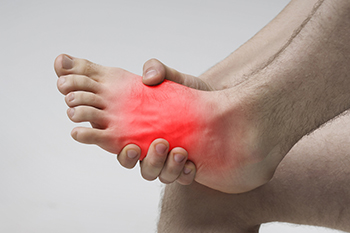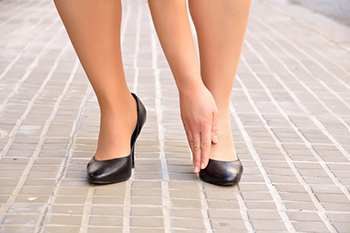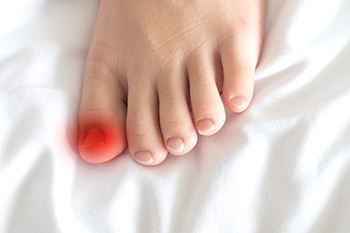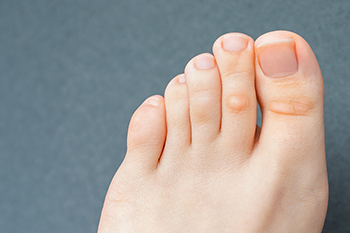Items filtered by date: June 2023
Arthritis Can Cause Pain in the Feet and Ankles
Facts About Stress Fractures in the Feet

One of the most common causes of pain among athletes and runners are stress fractures. These hairline cracks in the bones of the feet can happen from repetitive force that occurs each time the foot strikes the ground. Stress fractures have also been linked to poor eating habits, consuming too much alcohol, and smoking. In most cases, stress fractures can begin to develop with a sudden increase in activity. For example, a runner may increase mileage in too short a period of time. If the feet are not given enough time to recover, the bones can become vulnerable by working too hard to absorb repetitive shock. Reduced levels of vitamin D and calcium also may weaken bones, causing them to be at risk of stress fractures. Ill-fitting shoes, running on hard surfaces, and poor technique are other causes of stress fractures. A major symptom of stress fractures is pain that continues after the activity ends and the foot is at rest. Tenderness and swelling are other common symptoms. For help with foot pain caused by stress fractures, it is suggested that you visit a podiatrist.
Stress fractures occur when there is a tiny crack within a bone. To learn more, contact James Pak, DPM from California. Our doctor can provide the care you need to keep you pain free and on your feet.
How Are They Caused?
Stress fractures are the result of repetitive force being placed on the bone. Since the lower leg and feet often carry most of the body’s weight, stress fractures are likely to occur in these areas. If you rush into a new exercise, you are more likely to develop a stress fracture since you are starting too much, too soon. Pain resulting from stress fractures may go unnoticed at first, however it may start to worsen over time.
Risk Factors
- Gender – They are more commonly found in women compared to men.
- Foot Problems – People with unusual arches in their feet are more likely to develop stress fractures.
- Certain Sports – Dancers, gymnasts, tennis players, runners, and basketball players are more likely to develop stress fractures.
- Lack of Nutrients – A lack of vitamin D and calcium may weaken the bones and make you more prone to stress fractures
- Weak Bones – Osteoporosis can weaken the bones therefore resulting in stress fractures
Stress fractures do not always heal properly, so it is important that you seek help from a podiatrist if you suspect you may have one. Ignoring your stress fracture may cause it to worsen, and you may develop chronic pain as well as additional fractures.
If you have any questions, please feel free to contact our office located in Anaheim, CA . We offer the newest diagnostic and treatment technologies for all your foot care needs.
Wearing High Heels May Cause Ingrown Toenails

A common foot condition that can develop from frequently wearing high heels is ingrown toenails. Despite the pain and discomfort this ailment can cause, many women continue to wear this type of shoe and choose to suffer through the pain. When these types of shoes are worn, pressure can be exerted on the toes, possibly preventing the toenails from growing properly. Additionally, this may cause the nail to puncture the skin, and an infection may ensue. Ingrown toenails may be managed when high heels must be worn by refraining from wearing tight hosiery and soaking the feet in lukewarm water. Patients who have diabetes may need to pay extra attention if they have developed an ingrown toenail. It is beneficial to temporarily stop wearing the high heels that caused the toenail to become ingrown, and an infected ingrown toenail may require minor surgery for relief. If you wear high heels and have developed an ingrown toenail, it is suggested that you confer with a podiatrist who can help you to manage this condition.
High heels have a history of causing foot and ankle problems. If you have any concerns about your feet or ankles, contact James Pak, DPM from California. Our doctor can provide the care you need to keep you pain-free and on your feet.
Effects of High Heels on the Feet
High heels are popular shoes among women because of their many styles and societal appeal. Despite this, high heels can still cause many health problems if worn too frequently.
Which Parts of My Body Will Be Affected by High Heels?
- Ankle Joints
- Achilles Tendon – May shorten and stiffen with prolonged wear
- Balls of the Feet
- Knees – Heels cause the knees to bend constantly, creating stress on them
- Back – They decrease the spine’s ability to absorb shock, which may lead to back pain. The vertebrae of the lower back may compress.
What Kinds of Foot Problems Can Develop from Wearing High Heels?
- Corns
- Calluses
- Hammertoe
- Bunions
- Morton’s Neuroma
- Plantar Fasciitis
How Can I Still Wear High Heels and Maintain Foot Health?
If you want to wear high heeled shoes, make sure that you are not wearing them every day, as this will help prevent long term physical problems. Try wearing thicker heels as opposed to stilettos to distribute weight more evenly across the feet. Always make sure you are wearing the proper shoes for the right occasion, such as sneakers for exercising. If you walk to work, try carrying your heels with you and changing into them once you arrive at work. Adding inserts to your heels can help cushion your feet and absorb shock. Full foot inserts or metatarsal pads are available.
If you have any questions please feel free to contact our office located in Anaheim, CA . We offer the newest diagnostic and treatment technologies for all your foot and ankle needs.
What Has Caused My Ingrown Toenail?

Toenails grow over the skin, and an ingrown toenail occurs when the nail grows into the skin instead of over it. This can be an extremely painful foot condition, and may be caused by genetic reasons, or from wearing shoes that are too tight. It may also happen if a toe injury has occurred, such as stubbing the foot against a piece of furniture. Research has indicated that having poor posture may lead to developing an ingrown toenail. This may cause the toes to push together, and pressure can be exerted on them as they grow. Additionally, a common reason to have an ingrown toenail can be from cutting the toenails incorrectly, or from having poor foot hygiene. If you have an ingrown toenail, it is strongly suggested that you are under the care of a podiatrist who can correct this painful condition, which may include surgery for permanent relief.
Ingrown toenails can become painful if they are not treated properly. For more information about ingrown toenails, contact James Pak, DPM of California. Our doctor can provide the care you need to keep you pain-free and on your feet.
Ingrown Toenails
Ingrown toenails occur when a toenail grows sideways into the bed of the nail, causing pain, swelling, and possibly infection.
Causes
- Bacterial infections
- Improper nail cutting such as cutting it too short or not straight across
- Trauma to the toe, such as stubbing, which causes the nail to grow back irregularly
- Ill-fitting shoes that bunch the toes too close together
- Genetic predisposition
Prevention
Because ingrown toenails are not something found outside of shoe-wearing cultures, going barefoot as often as possible will decrease the likeliness of developing ingrown toenails. Wearing proper fitting shoes and using proper cutting techniques will also help decrease your risk of developing ingrown toenails.
Treatment
Ingrown toenails are a very treatable foot condition. In minor cases, soaking the affected area in salt or antibacterial soaps will not only help with the ingrown nail itself, but also help prevent any infections from occurring. In more severe cases, surgery is an option. In either case, speaking to your podiatrist about this condition will help you get a better understanding of specific treatment options that are right for you.
If you have any questions please feel free to contact our office located in Anaheim, CA . We offer the newest diagnostic and treatment technologies for all your foot and ankle needs.
Can Corns Be Prevented?

Corns on the feet can develop as a result of excessive pressure from shoes and socks that are worn. A corn is a small, hardened area of skin that often forms on the side of the pinky toe but may also form on top of the toes. While corns are generally uncomfortable, relief may be found when the pressure is removed and better fitting socks and shoes are worn. If the corn is severe, it may be surgically removed, which is a minor procedure. Many people choose to use a protective pad that is worn over the corn, which may be helpful in temporarily reducing the amount of pain. Maintaining proper foot care may be beneficial in preventing corns from developing. This can consist of washing and drying the feet thoroughly, followed by using a pumice stone that can remove hard skin. This is a practice that can help people who see the beginning of a corn developing. If you have one or more corns on your foot, it is suggested that you confer with a podiatrist who can treat it accordingly, and offer you additional prevention tips.
Corns can make walking very painful and should be treated immediately. If you have questions regarding your feet and ankles, contact James Pak, DPM of California. Our doctor will treat your foot and ankle needs.
Corns: What Are They? And How Do You Get Rid of Them?
Corns are thickened areas on the skin that can become painful. They are caused by excessive pressure and friction on the skin. Corns press into the deeper layers of the skin and are usually round in shape.
Ways to Prevent Corns
There are many ways to get rid of painful corns such as:
- Wearing properly fitting shoes that have been measured by a professional
- Wearing shoes that are not sharply pointed or have high heels
- Wearing only shoes that offer support
Treating Corns
Although most corns slowly disappear when the friction or pressure stops, this isn’t always the case. Consult with your podiatrist to determine the best treatment option for your case of corns.
If you have any questions please feel free to contact our office located in Anaheim, CA . We offer the newest diagnostic and treatment technologies for all your foot and ankle needs.

